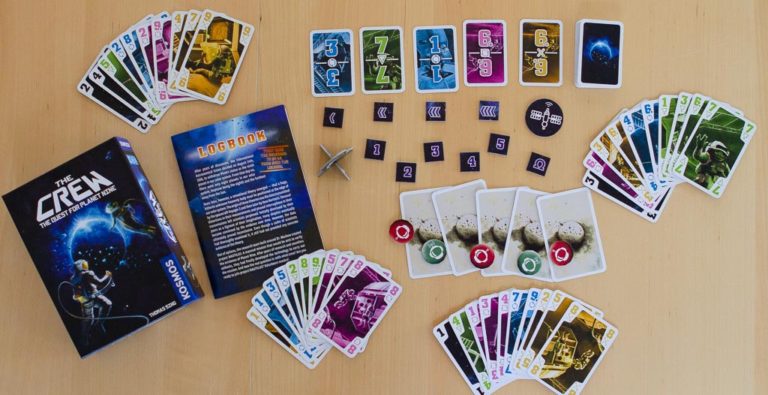Chronicles of Crime: 1900 is an app integrated detective game where players attempt to solve four unique cases. In this game, players find themselves as a journalist in Paris in 1900 trying to gather evidence and solve riddles to find the perpetrator. Players use a combination of an app and physical cards to question suspects, examine crime scenes, and ultimately solve the case.
The real question is not who committed the crime, but will the app help transport us back into 1900 Paris or keep us stuck in the modern-day?
How to Play Chronicles of Crime 1900
If you are familiar with the original Chronicles of Crime, you’re in luck; Chronicles of Crime 1900 plays identically. If not, you’re still in luck; this is an incredibly intuitive game to learn.
Players will need the free smart phone app to play; there is no way to play the game without it.
Players will pick one of the four cases that come in the box. Each case’s difficulty level varies from easy to hard. The physical game content consists of an evidence board, multiple location boards, cards for characters, special items, evidence, and puzzles.
Every card and location comes with a scannable QR code printed on it. The game’s app provides the story as short text blocks that share information about which character and location are available for you to investigate. Players will read these text blocks — they are not narrated.
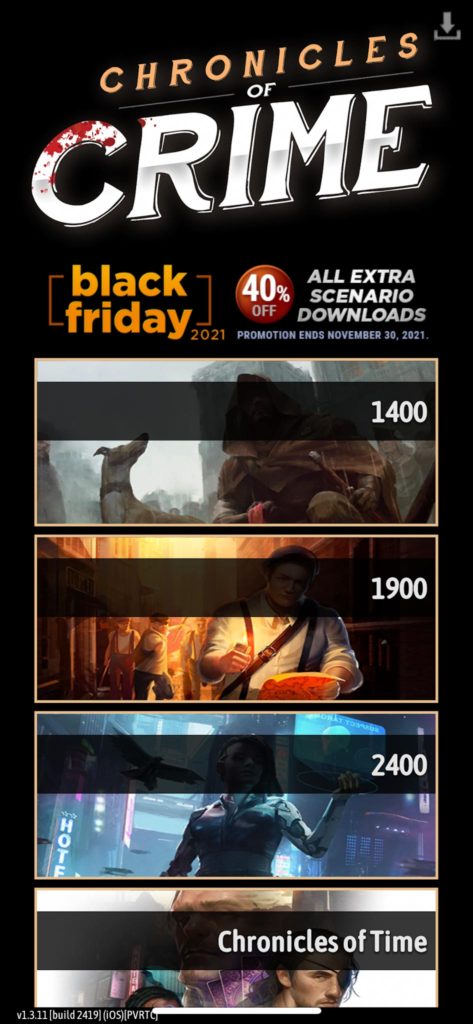
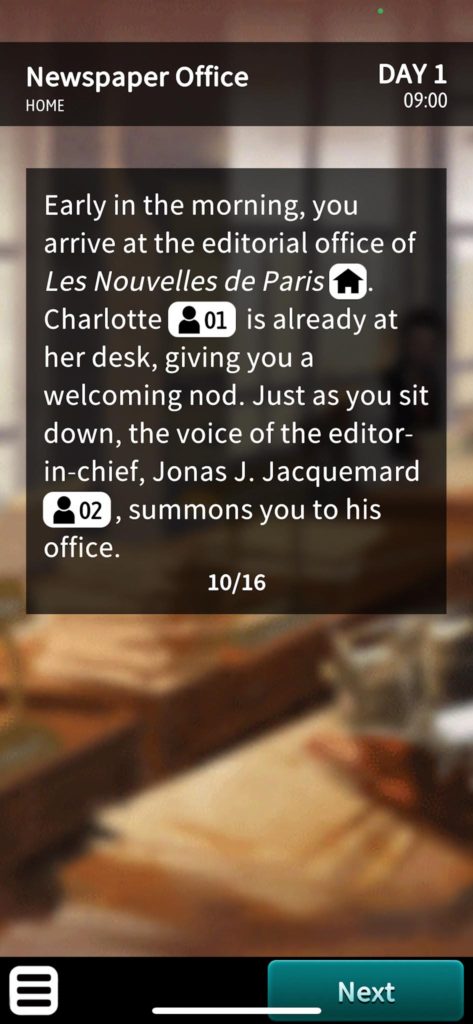

The majority of the gameplay involves players scanning various locations to discover more characters/evidence to interview and examine, using that knowledge to go to different locations to investigate, and hopefully gathering enough information to solve the case before time runs out.
For example, players may meet a character in the market and ask them questions about evidence cards found earlier. Players would first use the app to scan the character they want to investigate. Then players ask questions to the previously scanned person by scanning other suspects/evidence cards. If the questioned person has any information to share, that app will then share a series of short text narratives to read. Players can always leave a location and then come back later. But since time passes in the game, there is no guarantee that the character you questioned earlier will be there.
Players also have the help of Charlotte. Charlotte is an in-game character you can scan to gain clues if you get stuck on a puzzle or riddle.
In the end, you are racing against the clock to solve the case. Players earn a score based on how efficiency and accuracy in answering the questions related to the crime.
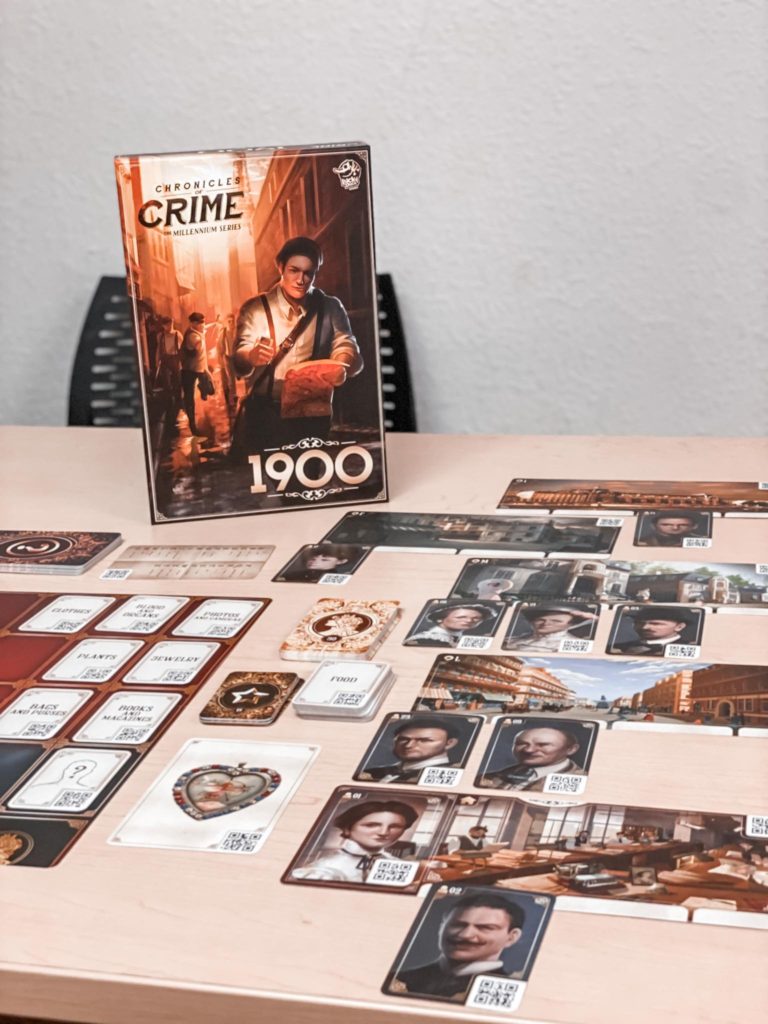


What Do We Think?
The Chronicles of Crime series is hands down my favorite cooperative deduction game. The gameplay perfectly blends a narrative-driven deduction game (like Sherlock Holmes Consulting Detective) with escape-room-style puzzles. (Note: For escape-room fun plus deduction elements, check out Exit: Theft on the Mississippi Queen)
Too often in other narrative games with large books of dialogue to read through you’ll catch a glimpse of a large block of text as you search through for the passage you’re supposed to read. This can lead to frustration as it tells players into what they should do next regardless if they uncovered the clues to get there. With Chronicles of Crime, everything is hidden within the app so you can’t accidentally read something you weren’t supposed to. This both makes solving the case even harder and more satisfying.
The game’s narrative elements were the right length and never became overwhelming to read while progressing the story. An in-game time limit kept the game’s playtime from being too long and stopped players from asking endless questions about each character. I love how the time and place of the case felt unique and preferred this theme over the modern-day setting of the original game.
It’s important to note that while time does move in the game, the game isn’t a set number of real-world minutes. You can take as long as you’d like, but each decision you make will impact the time you eat up in the game. Asking someone a question in the same room as you may only use up five minutes of your allotted time, but if you want to visit a different location that will take longer since you have to “travel” there.
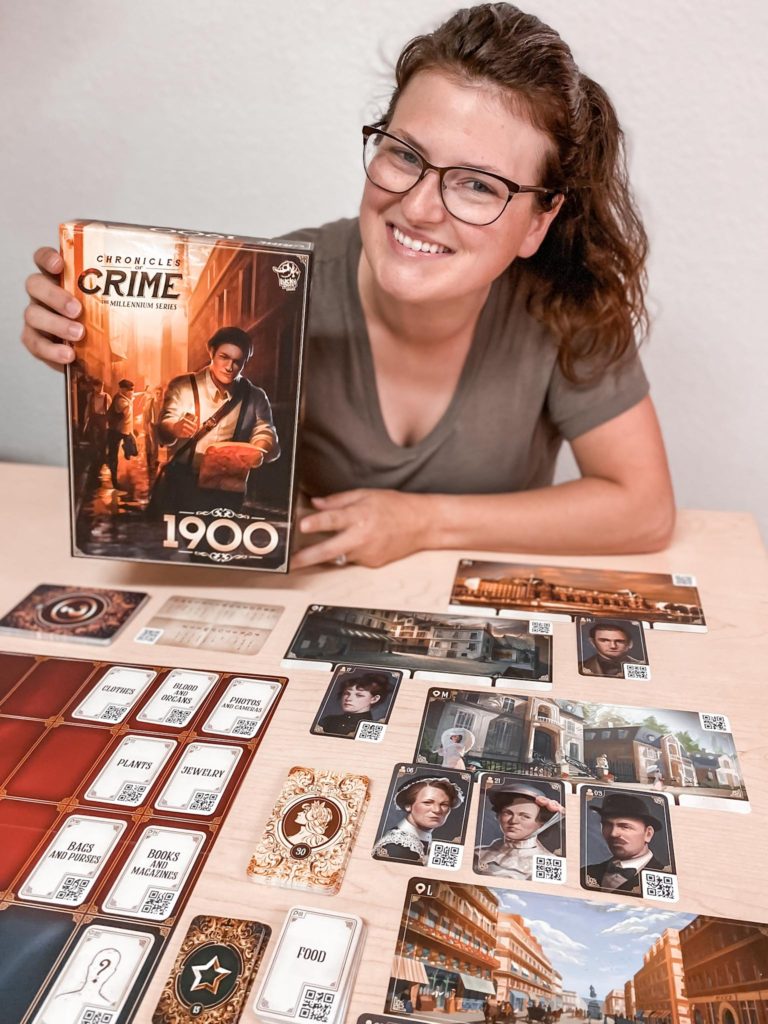

Chronicles of Crime 1900 and App Driven Gameplay
The Chronicles of Crime series would not be possible or this unique without its fantastic app. The app creates 3D crime scenes to explore, characters that can appear/disappear, and make the components reusable in new scenarios. The app only enhances the experience and world-building of the game. Never did I find myself pulled out of the game because I was using my phone. The app is so integral to the gameplay; it is in constant use, fully integrated into the experience instead of a side part of the game.
Where Chronicles of Crime 1900 Struggles
One minor downside we experienced was that in one of our games, my phone battery was about to die right at the end of the game, which would have prevented us from finishing. With this in mine, you’ll want to make sure you have plenty of charge on your device before you start playing.
Our largest critique of the game is that there is no way to have the text on the phone read to players in the game. I wish that there would either have been voice actors or even an ability to have text to speech for the blocks of text on your phone during the game. This isn’t a deal breaker for us by any means, it just would have been a nice accessibility feature.
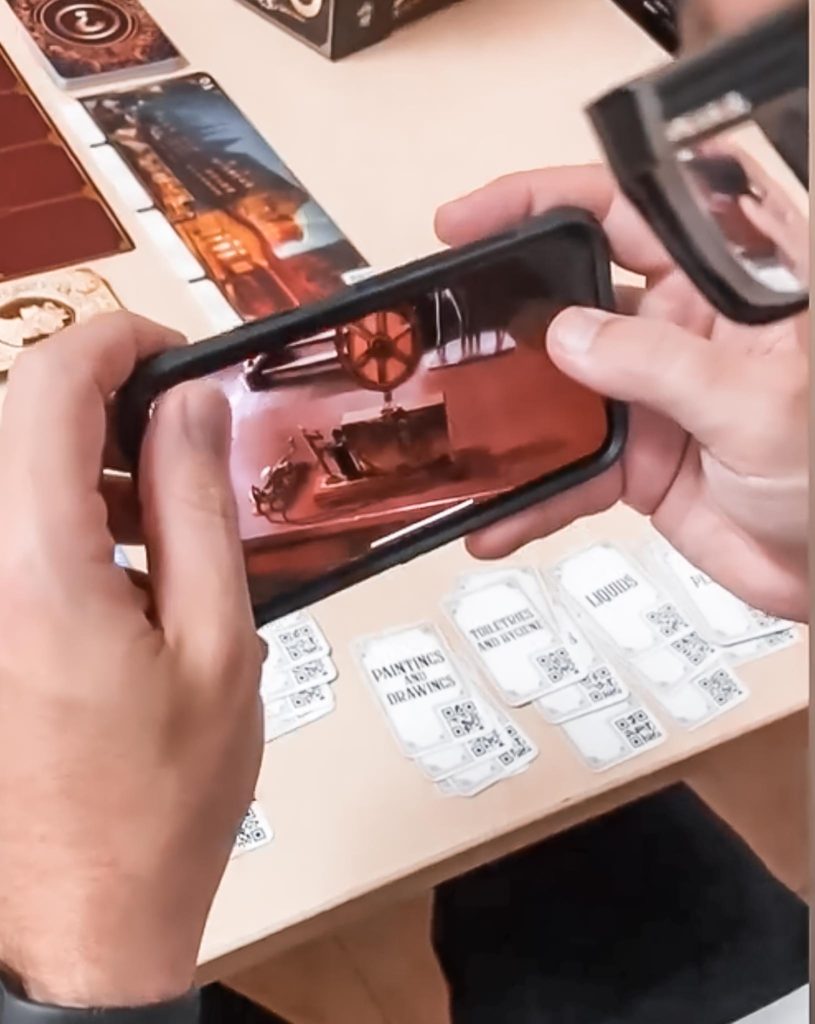
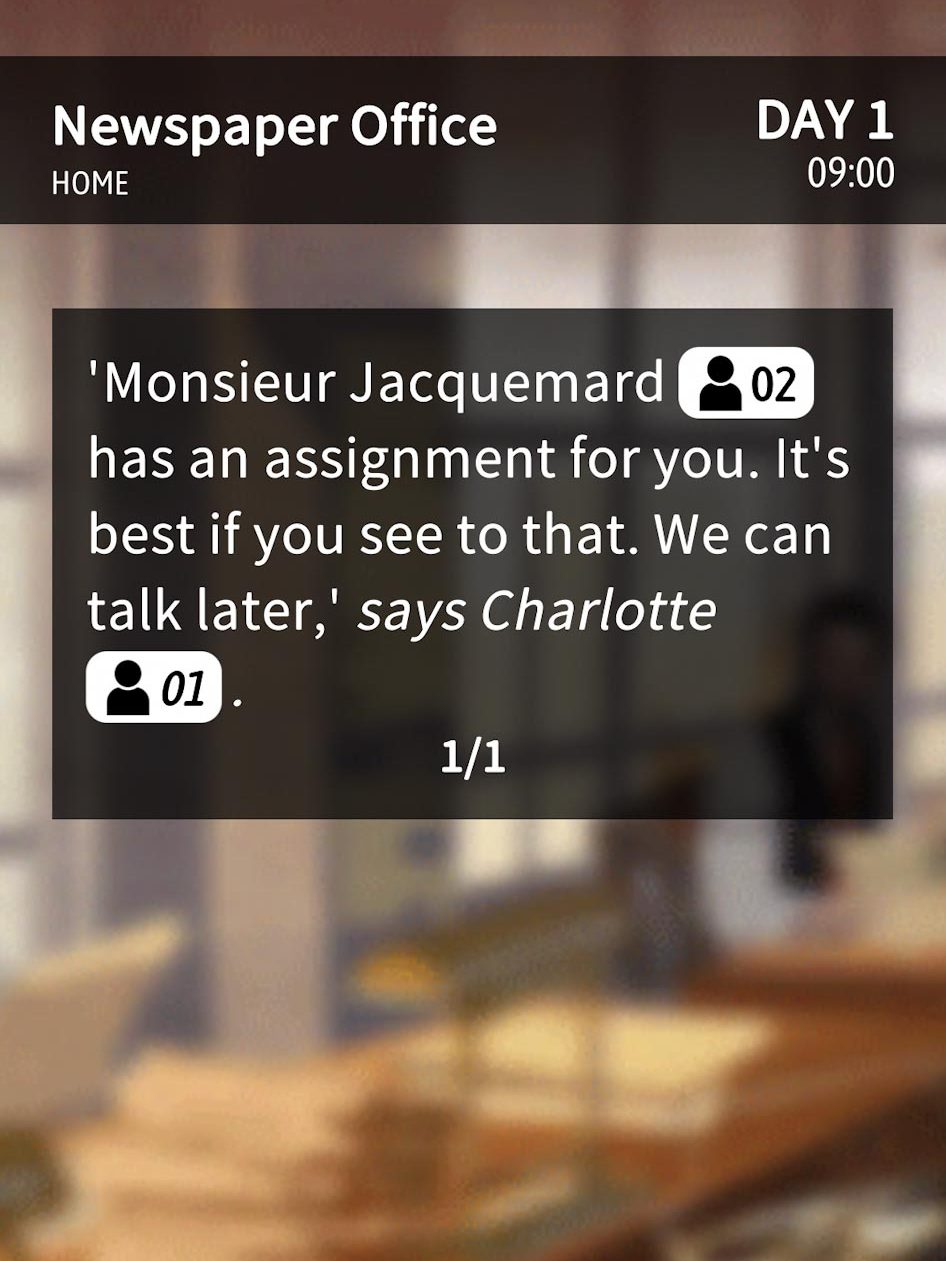
Summary
Chronicle of Crime: 1900 is an excellent game. A must-play for anyone who fancies themselves an amateur detective.
The app integration is a massive upgrade over multiple booklets of dialogues found in other narrative-driven cooperative deduction games. The theme and setting make this game unique enough that even if you have already played the original game, these new cases are worth checking out. Chronicles of Crime 1900 makes a great activity to gather family and friends around a table, get engrossed in the story, and solve a case thanks to the proper use of technology in a board game.
Note: These stories deal with mature themes. We recommend parents look over it prior to playing with children. If interested in playing with a younger audience Lucky Duck Games has made a version called Kids Chronicle which will feature similar gameplay for ages eight and up with age appropriate theming.
To bring home a copy of Chronicles of Crime 1900 click here.
Check out the original Chronicles of Crime here.
Find these and all our favorite board games on our Amazon Storefront.
A special thank you to our friends at Lucky Duck Games for sending us a copy of Chronicles of Crime 1900 for review.
As always our thoughts and opinions are our own.
Game Info:
Title: Chronicles of Crime: 1900
1-4 Players Ages 14+
Designer: David Cirurel, Wojciech Grajkowski
Artist: Matijos Gebreselassie, Karolina Jedrzejak, Mateusz Komada, Katarzyna Kosobucka, Aleksandra Wojtas
Publisher: Lucky Duck Games






